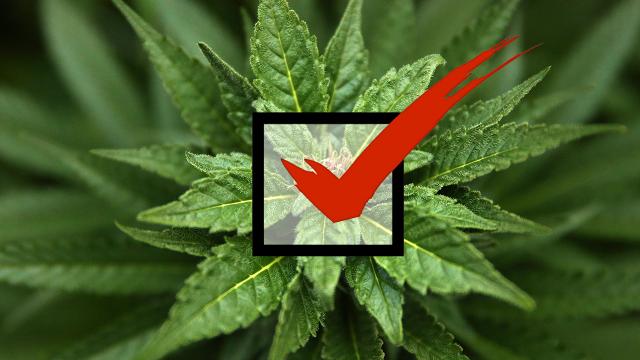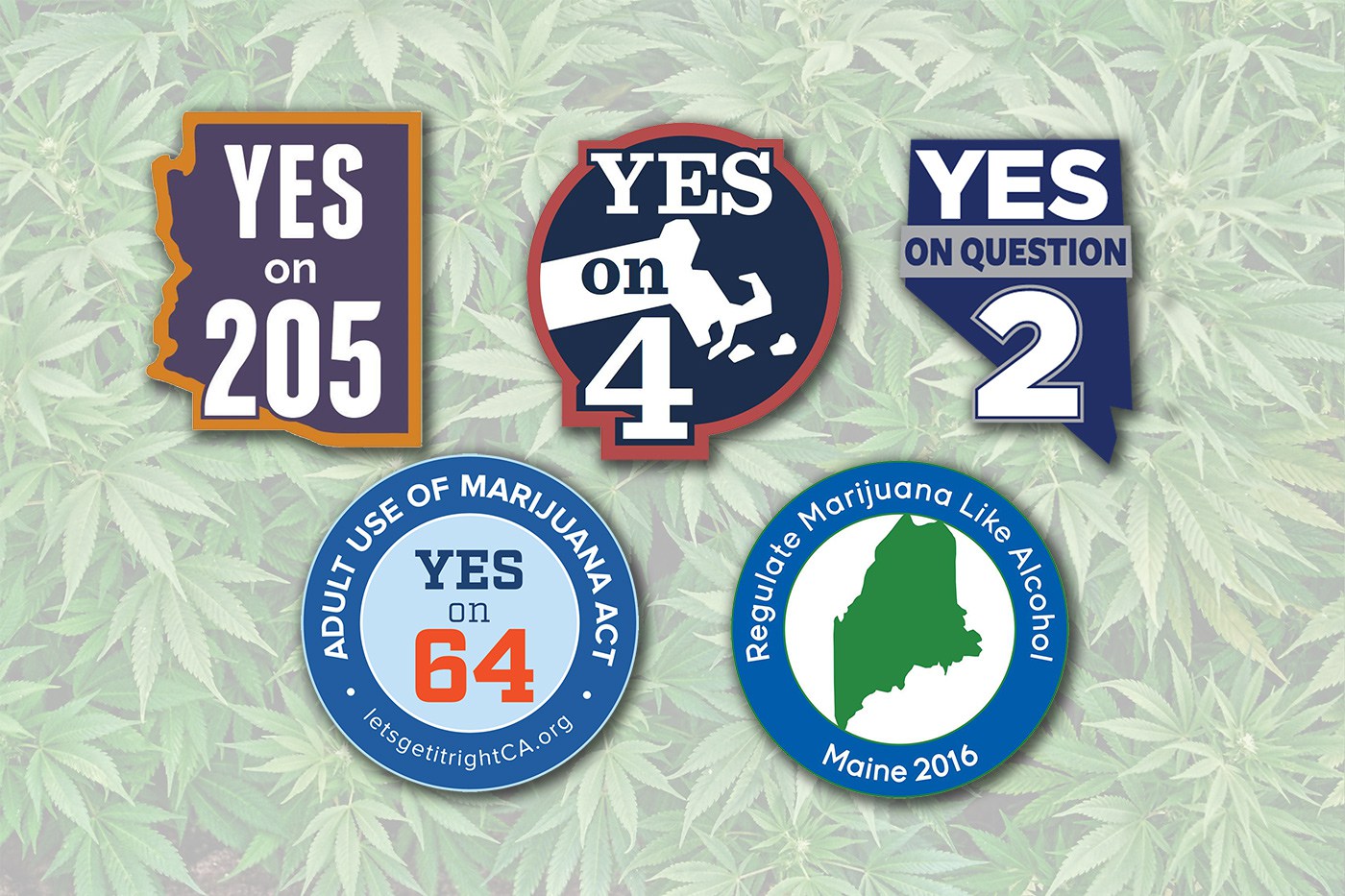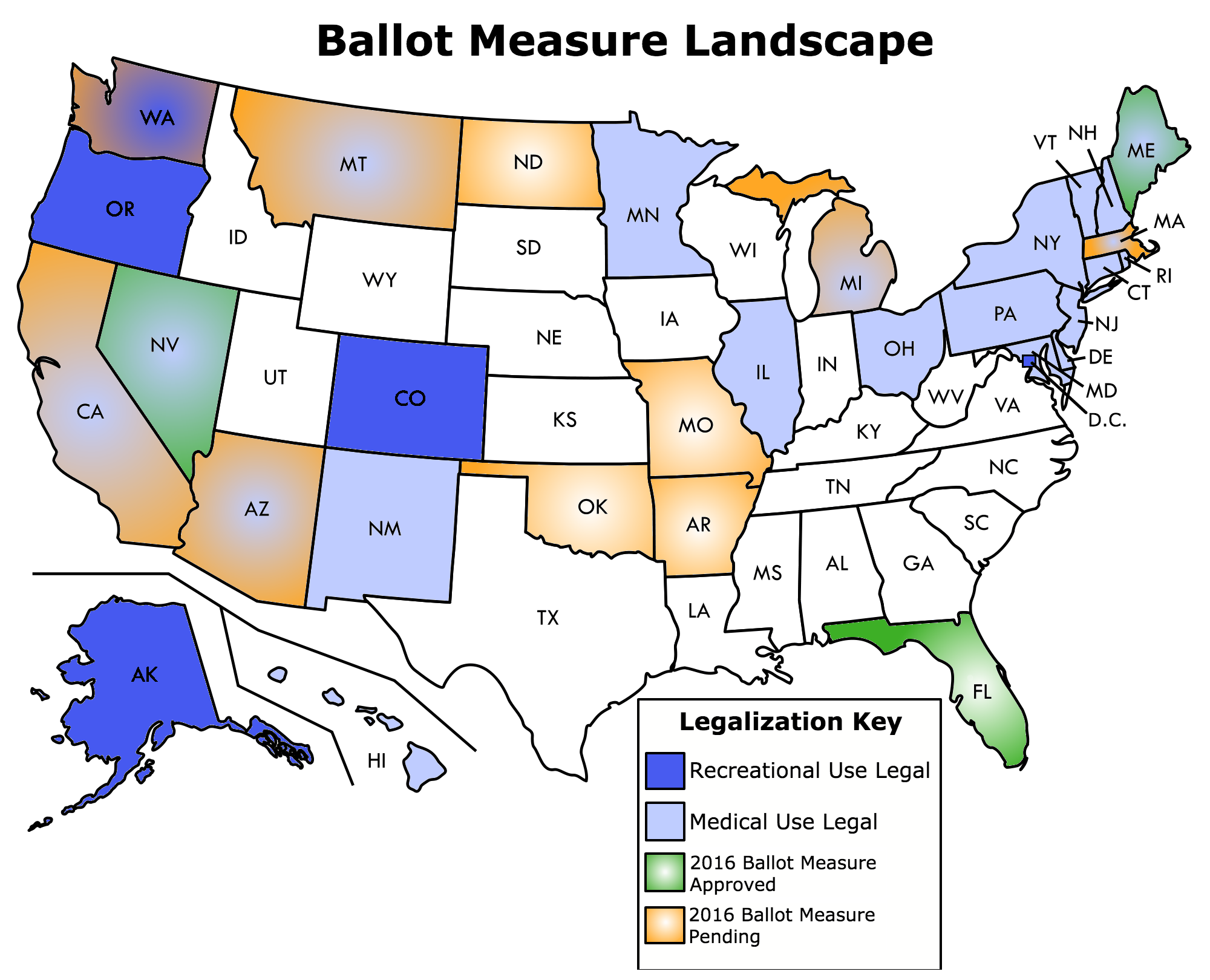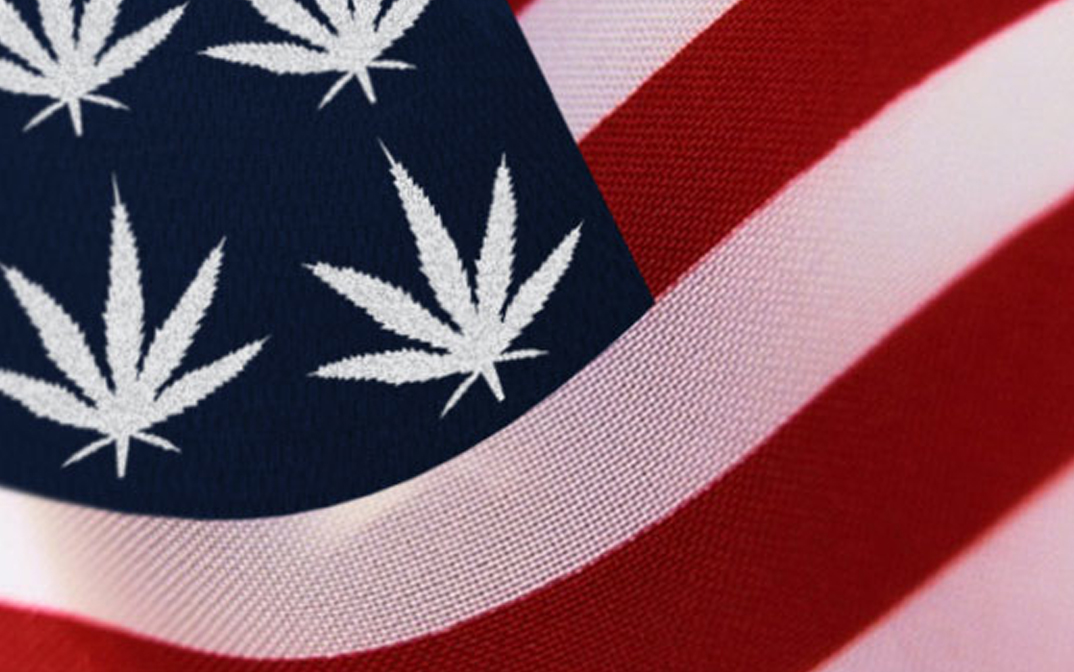
A potential sea change in marijuana legislation is coming, with ballot measures in several states giving voters the opportunity to make it legal for adults.
Arizona, California, Maine, Massachusetts, and Nevada will vote on legalizing recreational marijuana, while Arkansas, Florida, Montana, and North Dakota are considering medical marijuana initiatives.
Polls indicate the propositions will pass in several states, including California—historically a trendsetter in national politics, where supporters say a victory could start a domino effect that will see recreational marijuana legalized throughout the country. And public support for legal weed is at a record high of 60 percent, according to a recent Gallup survey.
If all goes well, after November 8, marijuana could be legal for medical or recreational use in 29 states.
Some advocates caution that the efforts may not help to achieve other goals that stem from legalization, such as criminal justice reform.
But proponents like the Drug Policy Alliance (DPA) point to measures that have already passed in states including Colorado and Alaska as evidence that legalization at any level helps increase public safety and boost local economies. The organization released a report with those findings last month, stating it was "so far, so good" in Colorado, Washington, Alaska, Oregon, and Washington, D.C., which collectively reported a plummeting rate of marijuana arrests, no significant increases in youth consumption, tax revenues that exceeded initial estimates, and no reports of dangerous road conditions from impaired driving.
"Marijuana prohibition has been a costly failure—to individuals, communities, and the entire country," Joy Haviland, DPA staff attorney, said at the report's release. "States that have chosen to legalize marijuana under state law should be praised for developing a smarter, more responsible approach to marijuana."
As the Los Angeles Times pointed out, local initiatives to loosen outdated restrictions could put pressure on the federal government to lift its ban on marijuana, amid a growing call to end the so-called "war on drugs."
The ballot measures for recreational legalization are:
Arizona Prop. 205
Prop. 205 would legalize recreational marijuana for adults over 21 years old. (Previous state ballot measures in 1996 and 2010 legalized medical marijuana.) Adults would be able to possess, manufacture, transport, and sell or give away up to one ounce of weed, and grow up to six plants at home.
The measure would establish a Department of Marijuana Licenses and Control, which would govern the growth, manufacturing, transportation, and sale of weed. Prop. 205 would also impose fines of up to $300 and community service for smoking in public places, underage use, unauthorized growth, or possession over the legal amount.
Sales would be taxed 15 percent. Revenues would be deposited into a "marijuana fund" and redistributed to areas with dispensaries, school districts, charter schools, and the state department of health services.
A recent Arizona Republic/Morrison/Cronkite News poll found that 50 percent of registered voters support the measure, with another 10 percent undecided and 40 percent opposed. Public opinion pollster Mike O'Neil, who was not involved in the survey, told the Arizona Republic that the results show "an evolving attitude on marijuana throughout the entire country, and we're part of that. People are no longer buying that this is just a horrible thing."
It was recently revealed that Insys Therapeutics, the maker of the fentanyl-based medication Subsys, is funding the opposition in Arizona. The Phoenix New Times reported in September that the company's stance against legalization comes as it prepares to launch "a pharmaceutical version of THC, the main psychoactive ingredient in cannabis."
California Prop. 64
California's Prop. 64 would legalize the recreational use of marijuana for adults over 21. Smoking would be permitted in homes or designated public sites, although it would remain illegal while driving or in any place that bans cigarettes. Adults would be allowed to possess up to 28.5 grams of marijuana and eight grams of concentrated marijuana.
Prop. 64 would re-designate the Bureau of Medical Cannabis Regulation as the Bureau of Marijuana Control, which would be responsible for governing and licensing.
Businesses would need to apply for a state sales license—a provision enacted to prevent corporate distributors from cornering the market. Prop. 64 would also create two new taxes, including a 15 percent retail tax which would be deposited into a marijuana fund and be redistributed to cover the expenses of enforcement, drug research, prevention, treatment, education, and other programs.
People under 18 who are convicted of use or possession would be required to take drug education, receive counseling, or do community service. Selling without a license could be punishable by a fine of up to $500 and/or up to six months in jail.
Perhaps most notably, individuals serving criminal sentences for convictions that would be made legal under Prop. 64 would be eligible for resentencing.
A recent op-ed in Colorlines by asha bandele, DPA's senior director of grants, partnerships, and special projects, and Rashad Robinson, executive director of the racial justice group Color of Change, also urged voters to vote for the measure as a means of repairing the long-standing, systemic civil rights violations imposed on communities of color by the war on drugs.
"Prop. 64 is, at its heart, a sentencing reform act...that centers repairing the harm done to communities targeted and disassembled by the drug war," with $50 million slated for black and Latino populations, bandele and Robinson write. "Prop. 64 sets a new bar in marijuana law reform, demanding that the way forward must include economic equity and the repair of the harms of the past."
Maine Question 1
Maine's Question 1 would legalize recreational marijuana in another state that has previously passed medical marijuana initiatives. Question 1 would regulate and tax weed as an agricultural product, allowing adults over 21 to use and possess it and establishing retail facilities and social clubs. The industry would be governed by the Maine Department of Agriculture, Conservation, and Forestry, and a 10 percent tax would be put on sales.
The Wellness Connection of Maine, a licensed medical dispensary, endorsed the measure. And polls have generally been positive, with the most recent survey (pdf), from March 2016, showing about 54 percent of Mainers in support of legalization.
The state's American Civil Liberties Union (ACLU) chapter also officially endorsed the ballot measure on Tuesday, writing to supporters, "Question 1 is a referendum on the failed war on drugs. It offers Maine a chance at sensible marijuana policy—one that protects children while allowing adults to make adult decisions...we have an opportunity to correct course, move toward sensible drug policy, and stop punishing adults who choose to use marijuana."
Massachusetts Question 4
A yes on [Question 4](https://ballotpedia.org/Massachusetts_Marijuana_Legalization,Question_4(2016) would make it legal for adults over 21 to use, grow, and possess up to 10 ounces of recreational marijuana and six plants in their homes and up to one ounce in public.
It would be regulated similarly to alcohol, overseen by the Cannabis Control Commission, which would also issue business permits.
Retail marijuana would be subject to a state sales tax as well as a 3.75 percent excise tax, with local municipalities also having the option of imposing an additional 2 percent tax. The revenues from these fees, as well as licensing costs and minor violation fines, would be placed into a marijuana fund, which would help pay for administrative costs.
Polls show 50 percent support legalization, with roughly 40 percent opposed and about 10 percent undecided.
Victories in Massachusetts and Maine could also influence future ballot measures throughout the East Coast—such as New York, where legislator Richard Gottfried, chair of the New York State Assembly health committee, told WAMC, "if Massachusetts moves forward with recreational use, that will help bring the day sooner when New York will do the same, and I think that would be a good thing."
Nevada Question 2
A yes on Question 2 would legalize use, possession, and cultivation of recreational marijuana for adults over 21—up to one ounce of weed or one-eighth of an ounce of concentrated weed—and regulate marijuana dispensaries, facilities, and distributors. It would also create an excise tax of 15 percent, with revenue being spent on enforcement costs and schools.
Polls are muddier in the Silver State. One recent survey found the pro-legalization side ahead at 57-33 percent and another found it at just 47-46 percent, which polling expert Anthony Williams told the Las Vegas Review-Journal was not a positive sign. "You would really want to have 55 to 60 percent support to feel confident heading into Election Day," Williams told the publication, which commissioned the latter survey.
And there are other concerns, particularly about casino magnate Sheldon Adelson's involvement in the opposition campaign. Recent reports revealed that he was single-handedly bankrolling the "no" effort, donating $2 million to opponents in Nevada alone, and an additional $1.5 million to fight the effort in California and the medical marijuana measure in Florida.
Mason Tvert, director of communications for the pro-legalization group Marijuana Policy Project, told the Washington Post last week that Adelson likely opposed the efforts because they would interfere with his profit margins. "If you like drinking alcohol and playing blackjack at the casino, Mr. Adelson wants you to be his guest," Tvert said. "If you prefer to consume marijuana while playing video games in the privacy of your home, Mr. Adelson wants you to be in jail."
3 WAYS TO SHOW YOUR SUPPORT
- Log in to post comments















Comments
Dave from New E... replied on
Legal MEDICAL cannabis is as far as anyone should go...
I have never used any "classically illegal drug" at any time in my life, and have no desire to - and most importantly I can NEVER be made to use something like "wacky-leaf", my preferred NON-vulgar term for cannabis in any and all things.
I will readily admit to being a dedicated pipe-smoking enthusiast since my late teens, and occasionally enjoy a good-quality cigar from time to time, especially to conclude a good meal...ALL solely enjoyed with only natural-leaf tobacco, and nothing else at ANY time. Anything "else", like cigarette addiction (which I've avoided entirely in my own life, HONESTLY!) and, yes, for one to addict themselves to recreational "wacky-leaf", is not and should NEVER be considered as "smoking" in any way, shape or form, but only as "self-pollution", especially from the toxic petrochemical additives that not only premade cigarettes, but also the loose-shred "RYO" substances better known as "butt-stuffins" are also loaded to the gunwales with.
As many useful medicines DO come from the plant world, I have no problems whatsoever with someone else using cannabis strictly AS a prescription medicine for genuine reasons...this would preferably be in a NON-combustible form, such as an edible OR injectible dosage form ONLY, especially if one's going to be around others for significant periods of time during a typical day.
However, as drug/substance addiction of nearly any variety is most appropriately seen as a "disease" to be treated in our times, it is COMPLETELY inappropriate to legalize recreational "wacky-leaf" for ANY reason, as that simply FEEDS THE DISEASE of addiction to it.
The Bay State has previously de-criminalized possession of small quantities of wacky-leaf nearly a decade ago, and more recently approved of legalized medical dispensaries for prescriptions for cannabis-based medicines - these are NOT the problem. Recreational "wacky-leaf" IS a potential problem, and with the aggressive language contained in Question 4 (on which both my mother and myself proudly voted NO on!), which in part seeks to completely remove any authority from local Bay State city and town governments as to both how many, and where the "head shops" that would be peddling the recreational wacky-leaf in local areas would be located within a city or town, are quite likely to allow the potential for such a "head shop" to be placed inappropriately close to public schools or houses of worship, and is something I have NO desire to allow.
Cannabis, to my own view, is something I can NEVER ingest in any manner (even as a medicine!) as I have no desire whatsoever to place my mind in a "mental fog" of any duration, for any reason...and the effects on my own digestive system of being around someone polluting themselves with combustible wacky-leaf for any length of time, are so intensely and INSTANTLY sickening and nauseating enough that such pain and dizziness can't be properly described in words, other than those that are far too vulgar to be usable in public for any purpose.
So, IF someone needs a cannabis-based MEDICINE for a genuine medical condition, that SHOULD be legal...but NOT recreational wacky-leaf, as that ONLY FEEDS THE DISEASE of cannabis addiction.